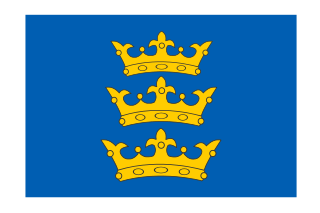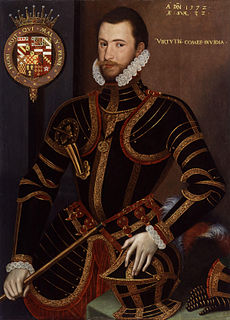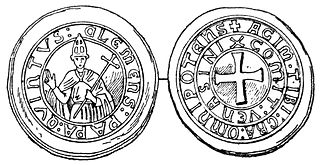
The dissolution of the monasteries, occasionally referred to as the suppression of the monasteries, was the set of administrative and legal processes between 1536 and 1541 by which Henry VIII disbanded monasteries, priories, convents, and friaries in England, Wales, and Ireland, expropriated their income, disposed of their assets, and provided for their former personnel and functions. Although the policy was originally envisaged as increasing the regular income of the Crown, much former monastic property was sold off to fund Henry's military campaigns in the 1540s. He was given the authority to do this in England and Wales by the Act of Supremacy, passed by Parliament in 1534, which made him Supreme Head of the Church in England, thus separating England from papal authority, and by the First Suppression Act (1535) and the Second Suppression Act (1539). While Thomas Cromwell, Vicar-general and Vice-regent of England, is often considered the leader of the Dissolutions, he merely oversaw the project, one he had hoped to use for reform of monasteries, not closure or seizure. The Dissolution project was created by England's Lord Chancellor Thomas Audley, and Court of Augmentations head Richard Rich.

The Lordship of Ireland, sometimes referred to retroactively as Norman Ireland, was the part of Ireland ruled by the King of England and controlled by loyal Anglo-Norman lords between 1177 and 1542. The lordship was created following the Norman invasion of Ireland in 1169–1171. It was a papal fief, granted to the Plantagenet kings of England by the Holy See, via Laudabiliter. As the Lord of Ireland was also the King of England, he was represented locally by a governor, variously known as the Justiciar, Lieutenant, Lord Lieutenant or Lord Deputy.

Walter Devereux, 1st Earl of Essex, KG, was an English nobleman and general. From 1573 until his death he fought in Ireland in connection with the Plantations of Ireland, most notably the Rathlin Island massacre. He was the father of Robert, 2nd Earl of Essex, who was Elizabeth I's favourite during her later years.

Lorcán Ua Tuathail, known in English as Laurence O'Toole and in French as Laurent d'Eu, was Archbishop of Dublin at the time of the Norman invasion of Ireland. Lorcán played a prominent role in the Irish Church Reform Movement of the 12th century and mediated between the parties during and after the invasion. He was canonised in 1225 by Pope Honorius III.

Sir John Norris or Norreys, of Rycote, Oxfordshire, and of Yattendon and Notley in Berkshire, was an English soldier, the son of Henry Norris, 1st Baron Norreys, a lifelong friend of Queen Elizabeth.

Henry Norris, 1st Baron Norreys of Rycote in Oxfordshire, was an English politician and diplomat, who belonged to an old Berkshire family, many members of which had held positions at the English court.

The Anglo-Norman invasion of Ireland took place during the late 12th century, when Anglo-Normans gradually conquered and acquired large swathes of land from the Irish, over which the kings of England then claimed sovereignty, all allegedly sanctioned by the purported Papal bull Laudabiliter. At the time, Gaelic Ireland was made up of several kingdoms, with a High King claiming lordship over most of the other kings. The Norman invasion was a watershed in Ireland's history, marking the beginning of more than 800 years of direct English/Welsh and, later, British, involvement in Ireland.

Richard FitzRalph was a scholastic philosopher, theologian, and Norman Irish Archbishop of Armagh during the 14th century. His thought exerted a significant influence on John Wycliffe's.

Hugh Carleton MRIA, 1st Viscount Carleton, PC (I), SL was an Irish politician and judge.

John Low or John Lowe was a medieval Bishop of St Asaph and then Bishop of Rochester, in Wales and England respectively. He was an Augustinian monk and opponent of the Lollard movement.
Thomas de Rossy O. F. M. was a late 14th century Scottish Franciscan friar, papal penitentiary, bishop and theologian. Of unknown, or at least unclear origin, he embarked on a religious career in his early years, entering the Franciscan Order, studying in England and at the University of Paris.

Donnchadh mac Briain, son of Brian Bóruma and Gormflaith ingen Murchada, was King of Munster.

James Bertie, 1st Earl of Abingdon, styled Hon. James Bertie until 1657 and known as the 5th Baron Norreys from 1657 until 1682, was an English nobleman.

James Carlile (1784–1854) was a Scottish clergyman from Paisley. He was a joint minister of a Scots church in Dublin and an Irish commissioner of education. He introduced a different style of education in Ireland whereby children of different denominations could go to the same school.
John Garvey (1527–1595) was an Irish Protestant Bishop of Kilmore and Archbishop of Armagh.

The Reformation in Ireland was a movement for the reform of religious life and institutions that was introduced into Ireland by the English administration at the behest of King Henry VIII of England. His desire for an annulment of his marriage was known as the King's Great Matter. Ultimately Pope Clement VII refused the petition; consequently, in order to give legal effect to his wishes, it became necessary for the King to assert his lordship over the Catholic Church in his realm. In passing the Acts of Supremacy in 1534, the English Parliament confirmed the King's supremacy over the Church in the Kingdom of England. This challenge to Papal supremacy resulted in a breach with the Catholic Church. By 1541, the Irish Parliament had agreed to the change in status of the country from that of a Lordship to that of Kingdom of Ireland.
Jonathan Christian, SL, QC, PC (I), was an Irish judge. He served as Solicitor-General for Ireland from 1856 to 1858. He was a judge of the Court of Common Pleas (Ireland) from 1858 to 1867 when he was appointed Lord Justice of Appeal in Chancery. On the creation of the new Irish Court of Appeal in 1878 he served briefly on that Court, but retired after a few months.

Sir John Jephson was an English soldier and politician who sat in the House of Commons between 1621 and 1625. He married into two prominent Anglo-Irish families, and spent much of his career in Ireland.

The medieval University of Dublin was an early but generally unsuccessful attempt to establish a university in Dublin, the capital city of the Lordship of Ireland. Founded in 1320, it maintained an intermittent existence for the next two centuries, but it never flourished, and disappeared for good at the Reformation in Ireland (1534–41). It was located in Saint Patrick's Cathedral, Dublin. It had no connection with the present University of Dublin, better known as Trinity College Dublin, which was founded in 1592.
John de Derlington was an English Dominican, Archbishop of Dublin and theologian.